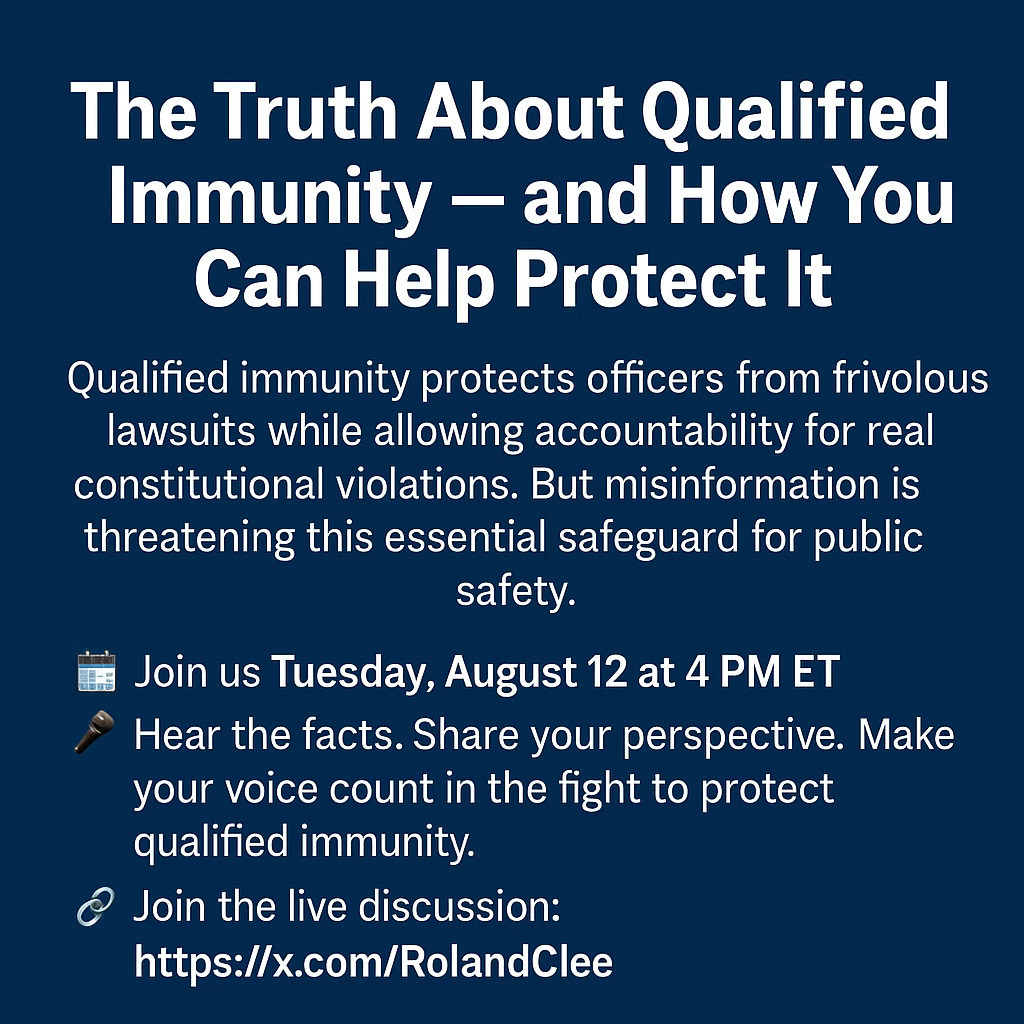Qualified Immunity: What You Need to Know and Why Your Voice Matters
Learn the facts, understand the stakes, and join our August 12 virtual town hall to speak up for law enforcement.

What do you know about qualified immunity and why is it important?
Every conversation I have about qualified immunity in law enforcement, I learn something I didn’t know or consider before. I know all the canned language, where it is a legal doctrine that shields government officials from being held liable personally for money damages in civil lawsuits unless they violate obvious constitutional or statutory rights.
For police, it is often applied in cases of excessive force under the Fourth Amendment. Qualified immunity, as the name states, is not absolute immunity. If an officer is shown to have violated a clearly established constitutional right whether the case applies to a stop, a search, a seizure, an arrest, even an application of deadly force, qualified immunity is overcome and that official can be held personally and financially liable. Properly applied, it is an effective barrier from frivolous lawsuits, especially for officers, deputies, and agents who are expected to make split second decisions in dynamic situations.
During Police Week in D.C. this year as a guest lobbyist with the Police Officers Defense Coalition I learned quickly that there is a partisan divide when it comes to pro-police public safety legislation. From the gallery of the House of Representatives, we saw a police bill prevail and move to the Senate despite significant opposition. The lesson was clear: we can win but nobody is going to make it easy. Learn more from this excellent article by Paula Fitzsimmons:
Currently the Qualified Immunity Act of 2025 is sponsored in the Senate (S.122) by Senator Jim Banks of Indiana and in the House (H.R.503) by Representative Virginia Foxx as a bill to “to codify the defense of qualified immunity in the case of any action under section 1979, and for other purposes.”
According to GovTrack.us, this bill has a 1% chance of being enacted.
While I understand not every bill will cross the desk of the president to be signed into law, but due to the overwhelmingly positive impact this would have on the law enforcement profession, this bill deserves an examination with fresh eyes. This isn’t the first time that Senator Banks has proposed this bill, but it is the first time during a Republican majority in the House and Senate. I can’t help but think that widespread misinformation, confusion and inaccurate conclusions contribute to the rocky road that this essential legislation has faced in Congress.
In fact, everyone in Congress needs to hear the importance of this issue from the front-line officers.
That’s why fellow coalition member Cori Huston and I have set up virtual town hall via X (formerly Twitter) Spaces on Tuesday, August 12 at 4 p.m. ET. We are building this aircraft in flight so we will learn as we go. If you are on X already, find me @RolandClee and you will be notified when the Space goes live. We look forward to listening to you about qualified immunity.
Please keep all peace officers in your prayers.
Roland Clee served a major Florida police department as a Community Service Officer for more than 26 years. His career included uniformed patrol, training, media relations, intelligence, criminal investigations, and chief’s staff. He writes the American Peace Officer newsletter, speaks at public safety, recruiting and leadership conferences and helps local governments and public safety agencies through his business, CommandStaffConsulting.com.
For media interviews and podcast appearances, click here: http://bit.ly/40pT3NS
References:
https://www.congress.gov/bill/119th-congress/senate-bill/122/text/is
https://www.govtrack.us/congress/bills/119/hr503#google_vignette





Really great article! Sorry I missed the X Spaces. I need to make the next one.
Roland,
Your impact and focus on this profession, the issues and solutions in the second chapter is having a real impact on the LE community, Thank You!